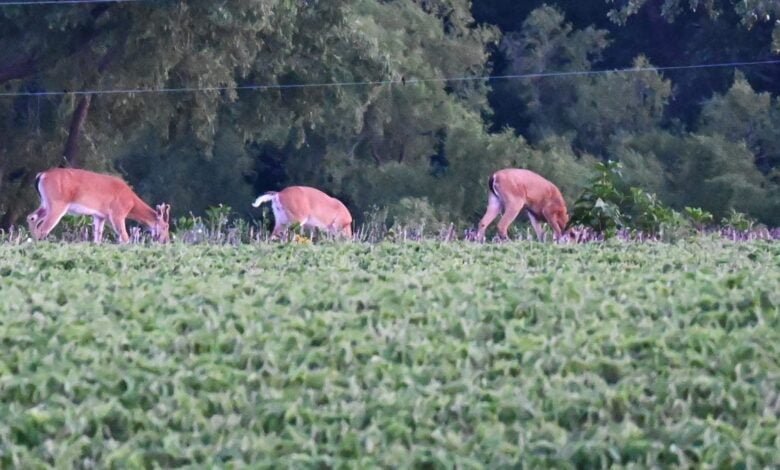Farmers can join DNR program to process nuisance deer for food banks

LANSING — The Michigan Department of Natural Resources is looking to team up with farmers and hunters to reduce the deer population in Berrien, Branch, Calhoun, Cass, Kalamazoo, and St. Joseph counties — in hopes of filling hungry stomachs with venison.
Michigan DNR Biologist Ken Keeson heads a program to sign up farmers to host a refrigerator trailer on their farms. Farmers and designated DNR-licensed shooters harvest deer as normal and then dress them in the refrigerator trailer as part of the program.
Kesson said a DNR representative will clean out the trailer and deliver the deer to a licensed processor. The DNR will pay for all processing, and the meat will then be packaged and returned to Southwest Michigan Food Bank or a local food bank for distribution.
“This program has great potential to help farmers with deer damage that need an avenue for storage and a mechanism to use problem animals,” Kesson said.
Rather than waste nuisance deer, the program allows farmers to contribute much-needed food resources to the local communities.
With crops out of the ground, “some farms, especially the large ones, seem to (experience) quite a bit (of) agricultural damage,” Kesson said.
Farmers with crop damage can obtain out-of-season permits to hunt the nuisance deer.
“They have a list of people they work with, employees, people that access the property that they are comfortable with and know,” Keeson said.
The out-of-season permit programs are not new. What is different is that selected farmers have refrigerator coolers to put the field-dressed deer in to preserve them.
“We’re packaging that up and then distributing it through the Sportsmen Against Hunger program to local food banks,” Keeson said. The DNR said each deer donated will provide roughly 160 high-protein and nutritious meals.
The six counties in the program have no cases of Chronic Wasting Disease or Bovine tuberculosis, which prevents the use of food. A 2023 test of the program with two farmers in each Branch and St. Joseph counties produced more than 1,000 pounds of processed venison, according to the DNR.
Those who wish to participate can contact Keeson at (269) 244-5928. “Leave a message and I will call them back,” he said
Subscribe Support local news. Subscribe to the Daily Reporter.
Branch and St. Joseph counties are very agricultural, providing food for foraging deer throughout the growing season. A 2017 DNR study showed that grown deer can eat around 2,000 pounds of plant matter annually, and deer damage can damage up to 10% of the field.
If the program works well, the DNR could “potentially expand the program to other areas of the state that have deer damage,” Kesson said, “It’s a big problem throughout a lot of Southern Michigan.”
— Contact Don Reid: dReid@Gannett.com
Source link




